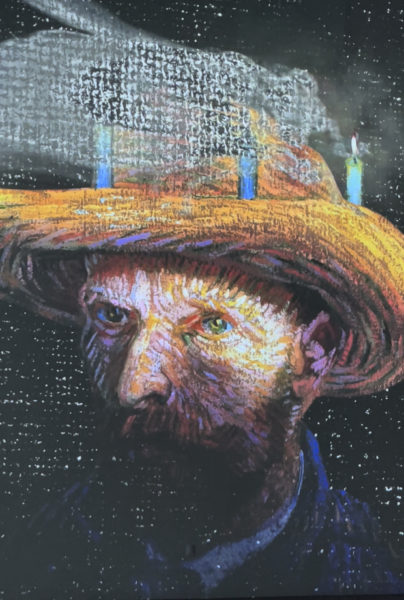Van Gogh

Earlier this year Michelle and I saw the Van Gogh exhibition when it was in town in Phoenix. To say it was incredible would be an understatement. We stuck around and “watched” the show nearly three times that day, each time from a different vantage point.
After that experience, I decided to dive into a massive book on the artist called Van Gogh: The Life by Steven Naifeh (see: Amazon link). This sucker is 976 pages or 45 hours of audiobook. This allows an extreme level of detail throughout his life and I’ll be honest, it’s a bit of a depressing read. Vincent was not the guy anyone assumed would make it and he dealt with massive challenges and failures for almost his entire life.
I’ve never spent much time painting, but it’s obvious that Van Gogh took liberties with the images he created. One of his explanations why was fascinating to me. “In drawing a wall, he said, ‘the artist who must copy every small stone and each stroke of whitewash has missed his calling: he should have become a bricklayer.’” I think this applies to artful storytelling as well. A good story is more than a retelling of the details and events that took place.
His life shows how an intense fanaticism in what you do will likely ostracize you from others while also allowing you to achieve greatness.
“Titanic, unappeasable passions swept through his life. ‘I am a fanatic!’ Vincent declared in 1881. ‘I feel a power within me … a fire that I may not quench, but must keep ablaze.’ Whether catching beetles on the Zundert creekbank, collecting and cataloguing prints, preaching the Christian gospel, consuming Shakespeare or Balzac in great fevers of reading, or mastering the interactions of color, he did everything with the urgent, blinding single-mindedness of a child.’”
Van Gogh read like a fanatic too. “He read with demonic speed, consuming books at a breakneck pace that hardly let up until the day he died. He would start with one book by an author and then devour the entire oeuvre in a few weeks.”
It was a constant reminder to me that oftentimes it’s the struggles we wish we never had that allow us to discover our greatest gift to others. As Naifeh writes,
“Every wave of ‘serenity and happiness,’ as well as every shudder of pain and despair, he believed, found its way into paint; every heartbreak into heartbreaking imagery; every picture into self-portraiture. ‘I want to paint what I feel,’ he said, ‘and feel what I paint.'”
After reading the book it almost feels selfish that we enjoy his work today as much as we do given how much anguish he was in as he created it. Yet, there is a sense of poetic beauty in that as well.
Oftentimes it's the struggles we wish we never had that allow us to discover our greatest gift to others. Click To Tweet
Do You Want to Read the Bible Without Falling Behind?
Sign up your email and I’ll send you a PDF to download and use my custom-made reading plan system. There’s no way to fall behind on this system and every day will be different no matter how long you use it!
I’ll send future content directly to your inbox AND you can dive into the Bible like never before.




